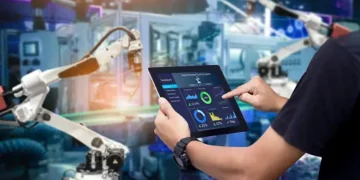Governments worldwide have shown an increasing interest in the origin and methods of production, placing greater demands on manufacturers to produce sustainably, cost-efficiently, and in proximity to their respective markets. With the aid of smart manufacturing technologies, encompassing AI, machine learning, robotics, and the industrial metaverse, the manufacturing sector is adapting to address these newfound challenges.
Looking ahead to 2024, a more practical approach is expected to take root in the manufacturing industry. The lofty declarations of the past, covering a range of topics from generative AI and the industrial metaverse to the reshoring of manufacturing jobs and autonomous vehicles, are likely to be tempered as manufacturers grapple with substantial issues like technical debt, regulatory frameworks, and complex global supply chains. While this shift in focus is a positive development, it’s regrettable that it has taken this long to materialize. Here are some of our predictions for 2024:
- Over 75% of industrial metaverse projects will rebrand to adapt to the changing landscape. The “metaverse,” which refers to the 3D layer of the internet, was the talk of the town in late 2021 and most of 2022. It garnered widespread attention in the media, with startups remotely associated with it enjoying inflated valuations. A year ago, Forrester anticipated the “metaverse winter” to arrive in 2023, and now we are witnessing the same cooling effect extending to the industrial sector. The industrial metaverse relies on established and proven technologies, distinct from the consumer or enterprise metaverse. However, the term itself is becoming a hindrance. In 2024, it’s likely that many of these projects will discreetly shed the “metaverse” label to maintain funding and executive support.
- Approximately 30% of Fortune 500 manufacturers will scale back plans to reshore manufacturing. The COVID-19 pandemic, post-pandemic supply chain disruptions, challenges involving container ships, and geopolitical complexities have made governments understandably apprehensive. They are now actively encouraging strategic industries, such as batteries and pharmaceuticals, through financial incentives, tax breaks, and calls for manufacturers to repatriate production and jobs sent offshore decades ago. Automation is pivotal for cost-effective manufacturing in labor-intensive markets. However, simply introducing robots into inadequately designed workflows is a recipe for disappointment. Bold promises made by Fortune 500 manufacturers to reshore manufacturing are likely to be revisited with greater caution in 2024 as the practicalities of these endeavors come under scrutiny.
Stay informed on supply chain news at The Supply Chain Report. Free international trade tools are at ADAMftd.com.
#SmartManufacturing #AIInManufacturing #IndustrialMetaverse #ManufacturingTrends2024 #ReshoringManufacturing #AutomationInIndustry #Fortune500Manufacturers #SustainableManufacturing #CostEfficientProduction #ManufacturingChallenges #MachineLearning #RoboticsInManufacturing #ManufacturingRevolution

















